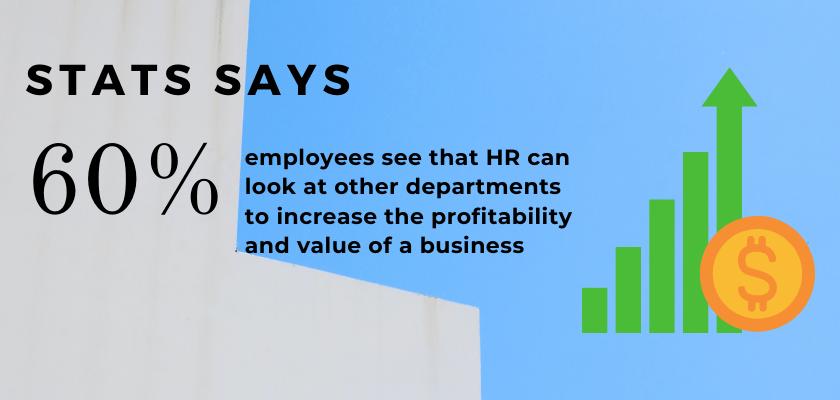Do HR departments are responsible for driving profits and revenues in a business? Let’s find out HR responsibility in this blog…
Human Resources occupy a specific space in increasing productivity within business operations. It involves the overall company performance, meaning it gives an analysis of how employees are working? Are employees able to meet their regular tasks or not? Is the company gaining profit or not? and much more. There are various responsibilities that come under the part of the human resources team.
In order to drive the profit for an organization, human resources(HR) manage the recruiting of new staff; meetings with executives on strategic planning; and even act as a connection between a company’s management and its workers.

Information Source: rmi-solutions.com
The main objective of human resources always remains the same as acquiring, expanding, and retaining a talented workforce. To remain competitive, the HR team of an organization does regular optimization of their employees’ to increase their effectiveness. This way they contribute to driving profits into the business.
Here are nine reasons why Human resources are so important for driving the profitability of an organization.
Highlights of Contents
10 Ways Human Resource Can Drive Profit in a Business
1. Include Your Hiring Plan, Profits, and Associated Outlays to Your Financial Model

Including these factors contribute to a quick hiring procedure, as the financial models portray everything about your cash flows. So, implementing this could save money on over-hiring and future layoffs. Although allow you to hire quickly to take advantage of market opportunities. Overall personal attention and increase the productivity of investments in these areas without sacrificing customer experience.
2. Enforce Digital Transformation in the HR Department
Digital transformation in HR departments leads to the automation of different processes and reduces the overall time required to finish a single task. Even the digital transformation will help in improving internal communication. The process speed-up the time to strategize and ultimately drives business profits. In collaboration with the IT team, the HR team continues digital evolution, hence improving all areas including HR: payroll, benefits, performance management, learning and development, rewards and recognition, and hiring.
3. Ensure a Healthy Working Environment for the Employee
It is an HR duty to confirm a healthy working environment for the employee. Maintaining good health in the office encourages employees to lessen absenteeism. On the other hand, it shows your concern for your employees’ health and well-being.
So nurturing good health at the workplace decreases the difficulty and physical and mental burnout. HR should enforce and encourage employee health and well-being strategies in the workforce. This will help boost overall employee engagement and productivity.
4. Ask Employees Feedback
Frequent employee engagement surveys are a tremendous method to gather a lot of worker feedback at a place. These are frequently very generous ways to analyze what actually employees are looking for? Giving everything without exception could be affecting employee satisfaction, engagement, and retention.
It has been assumed that rather than speculating or believing employees will respond, it’s better to hear it from them through filling up the feedback forms. After receiving the responses, act rapidly to get them what they need. Furthermore, HR can use these responses in order to fulfill their requirements and hence drive retention of the staff.
5. Better Employee Onboarding Process
Making sure that all new employees are provided satisfactory training and equipped with the right tools. This will result in a more profitable moment for an organization. Employees with the right tools are more productive than others. HR assumes a key function in the onboarding cycle and can take measures to guarantee that fresh recruits get the training they need. Hence, they are prepared to play out their positions at the most significant level.
6. Empower HR to Run Training

Employees are an organization’s greatest resource, and putting resources into ability is essential to practical business development and achievement. Organizations experience extensive cycles to enroll and recruit qualified and reasonable staff, yet frequently the priority on thinking about them stops there.
As indicated by a Gallup study, workgroups that are occupied with workers’ development saw a business increment and benefits twofold compared with companies that don’t do so. Dedicated training and improvement encourage worker devotion, and commitment is a basic increase in your organization’s financial performance. Let HR host internal hackathons, learning, and development training programs to enhance the skills of the employees.
7. Limiting the Legal Consequences
Something else that the HR division can do so as to improve the profits of the organization is to limit the danger of litigation. Shockingly, discontent workers can take legitimate activities against their boss, which can not exclusively be very time-consuming and harmful for the stardom of the given business.
Yet in addition, it leads to an expensive process. In any case, it is in the forces of the HR office to guarantee all the issues that may emerge are fixed at the beginning phases before the contention heightens any further. This converts into a genuine increment as the possibility of being hit with a claim against the organization breakdowns.
8. Transparency is the Key
The HR division ought to resemble a clear stream of water. Except if and until you are advised to hide certain parts of the business, you should tell the workers all that they have to know.
Trust comes when you are open and agreeable with the individuals you work with. Point by point notice of any allowances and rewards that the representative merits are critical to curbing future conflict. It uncovers that the worker’s wishes and theory are regarded. Also, HR is considered as the reflection of the higher specialists here.
At whatever point a change must be appointed, the HR must be completely legit about what precisely will occur. You ought to likewise make reference to the manner in which this change will be executed and about the following consequences. This way HR can earn trust hence results in employee retention which leads to company profits.
9. Budget Control

The HR department creates strategies for trimming the expenses related to workforce executives. Along these lines checking unreasonable spending and helping to save organization cash over the long haul.
These strategies may incorporate negotiating better rates for worker advantages, for example, medical care protection. What’s more, the HR division examines and investigates work drifts, the work market, and compensations dependent on work capacities to guarantee the organization’s wages are serious and sensible.
Since some independent companies have severe spending plans which they should follow, this capacity of the HR division is especially useful.
10. HR Team Involve in Company Branding
HR is likely the first element that helps companies to build their brand. They add up the values and create a clear vision to represent your business in the marketplace. Also, HRs’ are the only ones who hire the talent and put the adequate programs in a position for guaranteeing it is nurtured and grown.
Branding doesn’t mean a name and logo that differentiate you from others. It includes various norms to define a company as a brand. HR understands all those norms and acts as a pillar for the development of employees’ skills and marketing strategies. They make sure that the marketing team has all those relevant elements required for branding.
Tips: Know the Ultimate Cost Reduction Strategies in Business
Wrapping Up
HR drives profit and income in their organizations. HR takes the benefit of the opportunity to save their organization’s cash at every possible point. In addition, the higher management requires to expand a strategy that would impose a priority on the HR department. As their valuable contribution leads to widening the area of driving the profit for a company.
Frequently Asked Questions
Q1- Why Human resources important to organizations?
A1- Human resources are fundamental requirements of any organization. This department covers areas ranging from strategic planning to business vision. HR knows the technique to provide a number of duties to employees. They are also responsible for enhancing employees’ knowledge throughout the workforce and this practice tends to strengthen business operations which ultimately leads to profit.
Q2- Is HR required in a company?
A2- HR can perform a couple of duties to improve the company’s bottom line. They are responsible for recruiting new hires, retaining benefits and payroll, moderate conflict, and engaging in training and development. Their role directly affects the company’s success.
Q3- What are the HR duties?
A3- Some of the common HR duties are listed below:
- Hiring, Recruiting, and Retention.
- Budget control
- Employee conflict solution
- Employee satisfaction
- Handling the working environment
- Conduct training programs
Q4- What is the most important duty of an HR manager?
A4- The most important duty of an HR manager is to look after all the human resource management of the corporation is regulated smoothly. They are the company’s single face of the human resource department.
Q5- How does technology affect human resources?
A5- The use of technology can hugely affect the HR department of an organization. It permits the organization to improve its inner cycles, center capabilities, important business sectors, and authoritative structure, and much more. It provides proficiency and efficiency to the Human Resources

